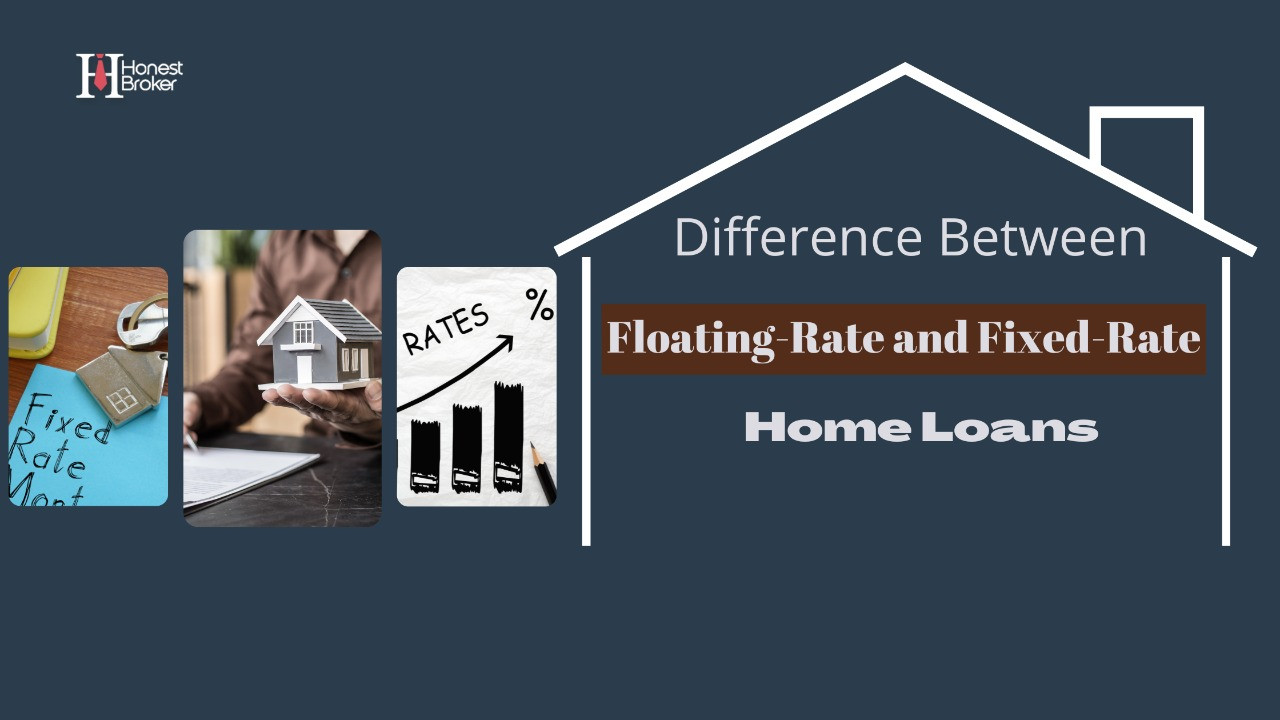 Blog
Blog
The interest rate of a home loan determines the bearer's financial stability, and that's why it's crucial to take note of this fact. Alongside the interest rate for your home loan, consider the kind of interest you decide for. There are two options to choose from fixed-interest home loans and floating-interest home loans. Both have advantages and disadvantages, so it's essential to know the difference.
Best Time to Choose Fixed-Interest Home loans
This kind of interest rate for home loans is the best option. If the interest rate when you take the loan is not too high and you wish to get the most out of it. For instance, it was at 12% a couple of years ago and is now at 10%. This is a great time to take out an interest-only loan at fixed rates. Additionally, if you're uneasy with fluctuating interest rates, this alternative can provide more stability. In addition, if you discover an interest rate falls to greater than 25-30% of your income per month after you've calculated the EMI, it is advisable to choose this rate.
Best Time to Consider Floating Home Loans
If you're knowledgeable about the actual real estate market, opting for a floating interest home loan is a good choice. If you're anticipating home loan rates to drop in the near term, selecting this option could provide you with a benefit.
Time-Bound Fixed Interest Rate
- Whether a home loan is the best choice between floating or fixed. It is based on your financial position and expectations, but bear in mind that many home loan companies offer both. This is also known as the time-bound fixed interest rate. In the initial several years in the tenor, which is typically 3 to 5 years, the loans are fixed interest rate loans. After that, it becomes a home loan with a floating interest rate loan. In the end, you will be able to take advantage of the best of both.
- If your lender gives you an option, it is crucial to select between floating interest loans and a fixed rate home loan. In this way, you'll get the advantages of both.
- Suppose the lender you are working with offers the option of choosing. In that case, it is essential to choose an interest-only loan that is floating after looking at the two options. In this way, you'll be able to evaluate the benefits of both options to meet your needs and choose the most effective one.
A fixed-rate loan has a fixed interest for the duration of the loan or for a specific part of the loan's length. If it's an available fixed loan, the EMI due for the institution is fixed. If a bank has an EMI set only for one specific period within the loan period, inquire with the bank whether rates will increase after the period (reset that clause). There is a possibility of negotiating the lock-in agreement to include the period you initially agreed upon and the length of time the lock-in is expected to last.
So, it's not a surprise that the estimated EMI for fixed-rate loans is determined in advance. This is the flow of cash planned at the start of the loan. If inflation and interest rates in the market rise over time, fixed EMIs seem to be steady and easy to prepare for. If you have an EMI fixed EMI that is decreasing. In this situation, any drop in interest rates in the market is not advantageous for you.
How Fixed-Interest Financing Works
The term "fixed interest rate" means that the interest rate you pay will be the same for the loan duration, regardless of any changes in rates on the market. The loan will be repaid by equal payments over time.
Pros
Be consistent throughout the duration
The principal benefit of fixed-interest financing is that the rate is the same, and the market prices fluctuate. What happens when the central bank, the Reserve Bank of India -- changes the rates that banks can loan and borrow.
It helps you organize your budget
The borrower can lock the interest rate according to their preferred budget in a fixed-interest rate scenario, and make plans for other financial matters. If you decide to go with the interest rate, you'll know precisely the installments throughout the loan.
Easy to understand
The fixed-rate mortgages are simple to comprehend and vary a little between lenders. They are an excellent option for those who plan their budget with care since the rate will require that you pay the exact quantity of instalments (EMIs) each year throughout the loan term.
Cons
Costlier
Because the rate remains constant for the duration of the loan and banks cannot charge interest rates, fixed interest rates typically range from 1.5% to 2% more than the floating rate. This can make your loan more expensive, even though it offers the regularity of installment payments it could provide.
Reduce the chance of paying less when rates drop
However, even if the rate falls in the market and those who selected a fixed-rate interest rate and have a fixed rate, their EMIs will remain the same. They will not be able to benefit from any decrease in rates.
It is difficult to obtain when rates are high.
If interest rates are very high, obtaining loans becomes complicated due to the need to make larger payments.
Exceptions
Certain fixed-rate loans can be fixed for only specific durations.
It is possible to have a situation where your fixed interest rate is only applicable for a couple of years, after which it converts automatically into a floating interest rate. In such instances, the fixed-rate interest could be revised, affecting the current repayment rate over the long term.
This is why it is essential to read the contract carefully to be aware of the specific terms and conditions of the loan.
How Floating-Interest Financing Works
- They are also known in the same way as "adjustable-rate home loans or flexible rate home loans ". It is a rate of interest that fluctuates with the changing market conditions triggered by economic fluctuations and contrasts to the fixed interest rate in which the rate stays the same over the entire duration.
- The floating interest rate is adjusted every month based on the terms and conditions of the loan. It could be monthly or half-yearly, and it could also be each year.
Pros
- Are connected by the repo rates
The interest rates of these loans are directly related to repo rates, which banks can now borrow money from the Reserve Bank of India (RBI). Compared to a fixed-rate mortgage for homeowners with floating rates are affordable in the long run.
- Base pay interest is applied
If you opt for floating rates of interest on your mortgage, you will have to pay a base rate of interest, which is an additional cost to the loan. When your base rate changes, the floating rate is also affected because this base rate is the interest rate set by the lender. The base rate is set by the RBI using a variety of economic aspects.
- Variable, but cheaper
A. The dependence on market developments causes them to fluctuate short term. However, it's less expensive than the fixed rate.
B. There is no upper amount to be allowed for the rate increase. However, the borrower saves money even if the interest rate goes up by 1 - 2% or more if a floating interest rate is chosen. When interest rates rise, the floating rate is usually adjusted. Rather than the monthly payment going upwards, the loan duration gets extended.
C. If market rates fluctuate toward the lower end, then floating rates are modified to lower the duration of the loan rather than impact the monthly payment.
- Imposes no prepayment penalty
A. The floating interest rate does not have a prepayment penalty. The RBI has prohibited any type of prepayment penalties imposed on any change to a lower rate in the event of a floating interest rate. But, this benefit doesn't apply to fixed rates since the penalty for prepayment remains in place if you end the loan before the scheduled payment period.
B. In recent times, floating rates have gained popularity among homeowners who require a home loan and banks. Many public sectors and private lenders offer a flexible rate as low as 6.7 %.
Cons
- Is unpredictable
This rate can be highly unpredictable, making it challenging for borrowers to establish their budget. This option may not suit those who need stability and security in their EMIs because the interest rate fluctuates frequently.
- It can be a hassle
There are instances that the interest rate will rise to the point that it becomes difficult for the borrowers to make their EMIs. This is because they are primarily dependent on markets, which could be unpredictable. - Could attract higher premiums
If the market isn't favorable, banks could have higher rates than the benchmark rate, affecting the pockets of the borrowers. - Makes planning finances difficult
When a loan rate changes, your EMIs may be affected. This could add a degree of uncertainty to your daily and financial planning. Additionally, you can save money if the floating interest rates don't exceed 11% or 11.5% for an extended duration.
How You Should Choose Between Fixed or Floating Interest Rates?
As an interest rate can be among the primary factors determining getting a home loan, knowing which to select from these options. Fixed and floating interest rates have advantages as well as disadvantages. Your choice should be based on which option gives you the financial ease you desire from your mortgage.
A method based on income
It is recommended to select the type of loan which best suits your budget and other requirements. Although the floating rate may be less expensive than the fixed rate, it may be challenging to determine your budget. However, choose a fixed interest rate. You may pay an excessive amount at the final if it allows for flexibility.
The approach based on age
Based on your age, a fixed rate may be an ideal option for borrowers that are 40 years or older. Since they can be confident in paying the same amount of EMIs without any unexpected costs. The borrowers aged 20 years and over are susceptible to taking chances and have ample time to pay back the loan. Thus, it would make sense to choose a floating interest rate.





